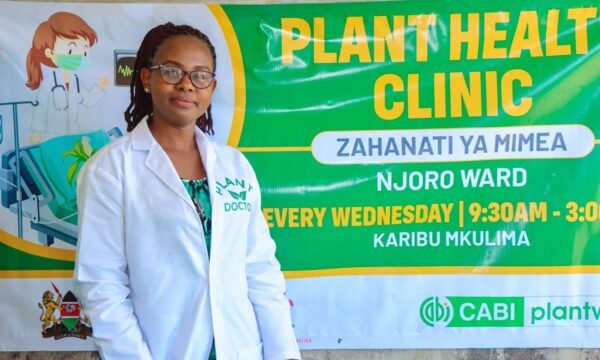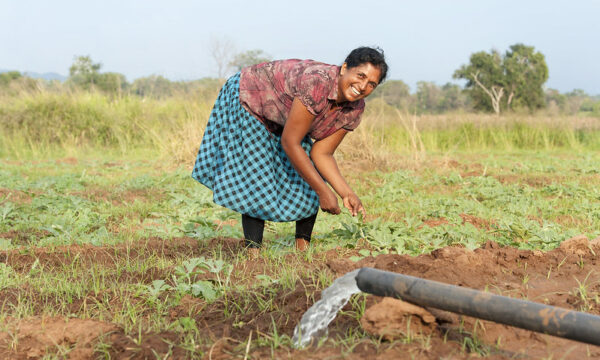In developing regions where pest and disease outbreaks and the impact of climate change is most devastating, early warning systems are required to build resilience into agricultural production. These early warning systems cannot operate in a void, but proves effective when incorporated within a national policy framework that can support a holistic plant health system approach.

Farmers attending a plant clinic in Myanmar
In Myanmar, the Ministry of Agriculture, Livestock and Irrigation (MOALI) has identified that its efforts to intensifying and diversifying agricultural production is being challenged by increasing pesticide use, illegal importation of pesticides, introduction of invasive species and slow response to disease and pest outbreaks. These issues have served as constraints to building a strong national plant health system as they undermine the resilience of millions of smallholder farmer who are key stakeholders in the agricultural sector.
Plantwise, through its network of plant clinics and its knowledge bank, aims to strengthen national plant health systems. In Myanmar, the Plantwise approach has gained high level buy-in as the government launched the Myanmar Plant Health System Strategy (MPHSS) based on the Plantwise framework and method of knowledge delivery. The MPHSS is the result of the close collaboration between CABI and the Ministry of Agriculture, Livestock and Irrigation (MOALI), Myanmar. This plant heath strategy is aimed at transforming the country’s agricultural extension approach by building on the Plantwise-based framework of action.
On 27 February 2017, The Ministry of Agriculture, Livestock and Irrigation (MOALI, Myanmar, in collaboration with the Centre for Agriculture and Biosciences International (CABI), organized the first donor forum in Yangon. The primary objective was to create awareness and provide impetus to the Myanmar Plant Health System Strategy (MPHSS) which was launched by H.E. Deputy Minister of Agriculture Dr. Tun Win in September 2016 MOALI’s. The donor forum also aimed at seeking endorsement and possible funding support for the implementation of the MPHSS.

The MPHSS donor forum
Speaking about the importance of a plant health system strategy in Myanmar, the Permanent Secretary of MOALI, Dr. Tin Htut, said that “the country needs an overall system-wide reform, and in that context, the MPHSS is very important for trade policy and food safety in the country.” He also stressed the key role that the CABI-Plantwise team played with supporting MOALI to develop the strategy which is a key component of the five year national plan (for agricultural development 2016-2020).
During the forum, CABI’s Plantwise Program Executive Dr. Washington Otieno talked about how Plantwise works with its partners to integrate the plant health system approach which is underpinned by its plant clinics, knowledge bank and ICT tools which are useful in early warning system and risk mitigation. CABI’s Regional Director for South East Asia (SEA) Dr. Sivapragasam gave the overall details of the MPHSS and the financial requirements for its implementation.
At the end of the event, delegates provided some useful feedback. It was recognised that to successfully implement the strategy, it is important to have private sector buy-in and partnerships between government and local agencies. It is also important to meet the consumers and market requirements and also ensure that MPHSS is properly institutionalised. In addition to ensuring proper coordination and cooperation, consideration should also be given to seed health, post-harvest aspects, green agriculture and geo data to support GAP and precision agriculture to optimize resources.
ActionAid Myanmar pledged to support MPHSS with the required hardware/software, capacity building and also support networking with other local agencies to pilot the strategy.
Contributed by Swe Thein (CABI Associate) and Dr Sivapragasam Annamalai (CABI). Additional writing by Bookie Ezeomah (CABI).
Related News & Blogs
How plant clinics are strengthening crop health services in Bangladesh
When the first-ever plant clinic in Bangladesh opened in Dhaka in 2013, it initially faced a lack of interest due to its novelty and limited awareness among farmers. However, it went on to expand, providing advice to over 17,000 farmers and led to the…
2 July 2025




